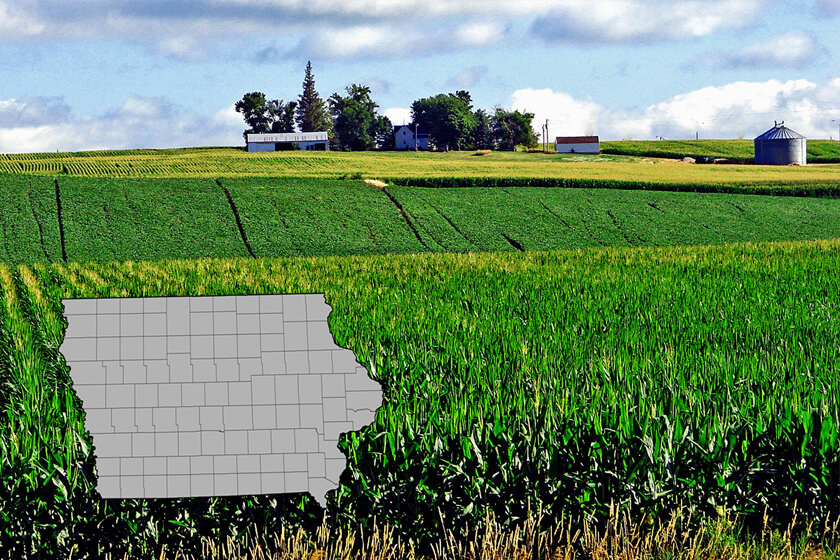West Long Branch, NJ – Democratic voters in the Hawkeye State like Joe Biden – a lot. The former vice president leads the pack and holds the best favorability rating in a field of two dozen presidential contenders, according to the first Monmouth University Poll of Iowa Democratic voters in the 2020 cycle. Other candidates also have strong favorability ratios that could help them crack the top tier once they become better known to caucusgoers. Health care and environmental concerns are the top issues for Iowa Democrats in deciding who to support for their party’s presidential nomination, but beating President Donald Trump is also a very important consideration.
In a field of 24 announced and potential candidates, Biden holds the lead with 27% support among Democratic voters who are likely to attend the Iowa caucuses in February. He is followed by Vermont Sen. Bernie Sanders (16%), South Bend Mayor Pete Buttigieg (9%), Massachusetts Sen. Elizabeth Warren (7%), California Sen. Kamala Harris (7%), former Texas Rep. Beto O’Rourke (6%), Minnesota Sen. Amy Klobuchar (4%), New Jersey Sen. Cory Booker (3%), and former cabinet secretary Julián Castro (2%). Former Maryland Rep. John Delaney, New York Sen. Kirsten Gillibrand, Ohio Rep. Tim Ryan, California Rep. Eric Swalwell, and entrepreneur Andrew Yang each receive 1% support from likely caucusgoers. The remaining 10 candidates earn less than 1% or were not chosen by any respondents in the poll.
Biden does especially well among voters age 65 and older (44%), those earning less than $50,000 a year (38%), and those without a college degree (34%). On the ideological spectrum, Biden’s support comes more from self-described moderates and conservatives (35%) than from liberals (20%), but the same is true for Sanders although to a lesser degree (20% non-liberals, 13% liberals). However, these non-liberal voters also tend to be less familiar with the large Democratic field except for Biden and Sanders.
“If Biden does get into this race, he’ll start out as a clear front-runner in Iowa. Not only does he garner support from crucial demographic groups but he is almost universally well-liked among all Democratic voters,” said Patrick Murray, director of the independent Monmouth University Polling Institute.
|
2020 DEMOCRATIC FIELD – IOWA PARTY VOTER OPINION | ||||
|
Total w/ | Net rating | Favorable |
| |
|
92 |
Joe Biden | +64 | 78 |
14 |
|
93 |
Bernie Sanders | +41 | 67 |
26 |
|
87 |
Elizabeth Warren | +47 | 67 |
20 |
|
74 |
Kamala Harris | +48 | 61 |
13 |
|
73 |
Beto O’Rourke | +47 | 60 |
13 |
|
70 |
Cory Booker | +38 | 54 |
16 |
|
61 |
Amy Klobuchar | +41 | 51 |
10 |
|
54 |
Pete Buttigieg | +36 | 45 |
9 |
|
54 |
Kirsten Gillibrand | +20 | 37 |
17 |
|
48 |
Bill de Blasio | 0 | 24 |
24 |
|
45 |
Julián Castro | +27 | 36 |
9 |
|
43 |
John Delaney | +19 | 31 |
12 |
|
42 |
Tulsi Gabbard | +16 | 29 |
13 |
|
40 |
John Hickenlooper | +24 | 32 |
8 |
|
31 |
Jay Inslee | +21 | 26 |
5 |
|
31 |
Eric Swalwell | +15 | 23 |
8 |
|
30 |
Tim Ryan | +10 | 20 |
10 |
|
27 |
Terry McAuliffe | +1 | 14 |
13 |
|
24 |
Michael Bennet | +10 | 17 |
7 |
|
24 |
Andrew Yang | +6 | 15 |
9 |
|
18 |
Steve Bullock | +4 | 11 |
7 |
|
17 |
Marianne Williamson | -1 | 8 |
9 |
|
11 |
Seth Moulton | -1 | 5 |
6 |
|
9 |
Wayne Messam | -3 | 3 |
6 |
|
| ||||
Biden has a 78% favorable to 14% unfavorable rating among likely Democratic caucusgoers. Sanders also has a strong favorable rating (67%) but his unfavorable rating (26%) is higher than any of the two dozen contenders included in the poll. Warren is nearly as well-known as Sanders and has a more positive net rating at 67% favorable to 20% unfavorable. In fact, most of the field earns largely positive ratings from Iowa Democrats. Other well-known candidates include Harris (61% favorable to 13% unfavorable), O’Rourke (60% to 13%), and Booker (54% to 16%). A majority of voters are also familiar with Klobuchar (51% favorable to 10% unfavorable), Buttigieg (45% to 9%), and Gillibrand (37% to 17%).
“Buttigieg’s current standing in the horse race is impressive given that nearly half of likely Democratic caucusgoers have yet to form an opinion of him. He has one of the best positive to negative ratios in the field. He could move up if he is able to maintain that rating as he introduces himself to more voters. Klobuchar is another candidate with potential to increase her support as she becomes better known based on her current ratings ratio,” said Murray.
Less than half of likely caucusgoers are able to offer an opinion of the remaining 15 candidates. Among this group, two governors have very strong ratings ratios among voters who can offer an opinion of them – Colorado’s John Hickenlooper at 32% favorable to 8% unfavorable and Washington’s Jay Inslee at 26% favorable to 5% unfavorable. New York City Mayor Bill de Blasio has one of the weakest ratios at 24% favorable to 24% unfavorable. Miramar, Florida Mayor Wayne Messam, Massachusetts Rep. Seth Moulton, and author Marianne Williamson have even weaker ratios but they are all unfamiliar to more than 5-in-6 likely caucusgoers.
The top issue that Iowa Democrats are thinking about in choosing a presidential nominee is health care (51%), followed by environmental concerns (17% climate change and 12% environment in general). Other issues important to voters include immigration (14%), education (14%), jobs (13%), beating Trump (10%), civil rights (8%), taxes (7%), Social Security (7%), personal integrity (5%), national security (4%) and a number of other issues named by 3% or less. While health care is the main concern for voters in all income brackets, those who earn less than $50,000 a year (60%) are more likely than voters earning between $50,000 and $100,000 (44%) or more (42%) to name it as one of their top issues. Liberal voters (42%) are more likely than non-liberals (16%) to identify the environment as an issue that will impact their support in the caucuses. Civil rights is a relatively higher concern for voters under age 50 (16%) than it is for older voters (3%).
“Here’s one example of why this race is very open despite the possibility of having a nominal front-runner if Biden gets in. Health care and the environment are clearly the top issues in this race, but it doesn’t look like any candidate owns a clear advantage on them. And there are a bunch of other issues that candidates may be able to leverage into voter support over the next few months,” said Murray.
The candidate preferences of those who name health care as a top issue look fairly similar to the statewide results – 30% of health care voters back Biden to 16% for Sanders, 9% for Buttigieg, 7% for O’Rourke, 6% for Harris, and 6% for Warren. There is no clear favorite, though, among Democrats who name climate change or the environment as their top concern – 15% of this group support Buttigieg, 14% Biden, 12% Sanders, 10% Harris, 7% Warren, 7% Klobuchar, and 5% O’Rourke.
Democratic activists have been trying to move the party to the left on both health care and the environment. Nearly half of likely caucusgoers (49%) say it is very important to them that the party nominates someone who supports “Medicare for All.” Another 33% say this is somewhat important, 7% say it is not important, and 12% are not sure. Only 3-in-10 likely caucusgoers (31%) say it is very important to them that the party nominates someone who supports the “Green New Deal.” Another 41% say this is somewhat important, 11% say it is not important, and 18% are not sure.
“The Medicare for All push seems to resonate more in Iowa than the Green New Deal, although these are largely catch phrases at this early stage of the campaign. It does seem that candidates have an opportunity to coalesce a sizable voting bloc around an environmental agenda,” said Murray.
While issue positions are important to Iowa Democrats, the overwhelming majority (64%) prefer to have a nominee who would be strong against Trump even if they disagree with that candidate on most issues. If they were forced to choose, just 24% say they would favor a candidate who they are aligned with on the issues even if that person would have a hard time beating Trump. Biden garners more support among voters who prioritize beating Trump (33%) than he does among those who are looking for issue alignment (15%). Sanders, on the other hand, does slightly better with “issue” voters (19%) than “electability” voters (13%). There are no significant differences in support for other candidates between the two types of voters.
“Ousting Donald Trump is the through line for this nominating process. But Iowa Democrats draw a distinction between beating the president at the ballot box and calling for his immediate removal. A candidate’s support for impeachment is not a litmus test for the party faithful,” said Murray.
Just 16% of likely Democratic caucusgoers say it is very important to them that the party nominates someone who supports impeaching Trump. Another 22% say it is somewhat import, while half (51%) say it is not an important consideration and 12% are not sure.
The poll also finds some interesting demographic breaks in support for emerging candidates. Buttigieg gets more support from liberals (13%) than non-liberals (5%). The same is true of Warren (12% liberals and 3% non-liberals) and Harris (10% to 4%). Also of note, Buttigieg has significantly more support among Democrats living in the 3rd Congressional District, including Des Moines, (20%) than he does in the other three districts (between 3% and 5%). Harris has more support in the relatively Democratic 2nd district (15%) than she does in other districts (between 3% and 5%). Buttigieg (12%) and Harris (13%) both have more support among college graduates than they do with voters who do not have a college degree (6% for Buttigieg and 1% for Harris).
The Monmouth University Poll was conducted by telephone from April 4 to 9, 2019 with 351 Iowa voters who are likely to attend the Democratic presidential caucuses in February 2020, out of 761 registered Democrats that were contacted for the poll. The question results in this release have a margin of error of +/- 5.2 percentage points. The poll was conducted by the Monmouth University Polling Institute in West Long Branch, NJ.
QUESTIONS AND RESULTS
(* Some columns may not add to 100% due to rounding.)
1. If the Democratic caucuses for president were today, would you support – [NAMES WERE ROTATED]? [If UNDECIDED: If you had to support one of these candidates at this moment, who do you lean toward?]
| (with leaners) | April 2019 |
| Joe Biden | 27% |
| Bernie Sanders | 16% |
| Pete Buttigieg | 9% |
| Kamala Harris | 7% |
| Elizabeth Warren | 7% |
| Beto O’Rourke | 6% |
| Amy Klobuchar | 4% |
| Cory Booker | 3% |
| Julián Castro | 2% |
| John Delaney | 1% |
| Kirsten Gillibrand | 1% |
| Tim Ryan | 1% |
| Eric Swalwell | 1% |
| Andrew Yang | 1% |
| Steve Bullock | <1% |
| Bill de Blasio | <1% |
| Tulsi Gabbard | <1% |
| Jay Inslee | <1% |
| Michael Bennet | 0% |
| John Hickenlooper | 0% |
| Terry McAuliffe | 0% |
| Wayne Messam | 0% |
| Seth Moulton | 0% |
| Marianne Williamson | 0% |
| (VOL) No one | 1% |
| (VOL) Undecided | 12% |
| (n) | (351) |
2. And who would be your second choice?
| April 2019 | |
| Joe Biden | 12% |
| Kamala Harris | 12% |
| Elizabeth Warren | 10% |
| Beto O’Rourke | 8% |
| Bernie Sanders | 8% |
| Pete Buttigieg | 6% |
| Cory Booker | 6% |
| Amy Klobuchar | 3% |
| Tulsi Gabbard | 2% |
| Julián Castro | 1% |
| Kirsten Gillibrand | 1% |
| John Hickenlooper | 1% |
| Tim Ryan | 1% |
| Marianne Williamson | 1% |
| John Delaney | <1% |
| Jay Inslee | <1% |
| Eric Swalwell | <1% |
| Andrew Yang | <1% |
| Steve Bullock | 0% |
| Michael Bennet | 0% |
| Bill de Blasio | 0% |
| Terry McAuliffe | 0% |
| Wayne Messam | 0% |
| Seth Moulton | 0% |
| (VOL) No one | 10% |
| (VOL) Undecided | 18% |
| (n) | (351) |
3. I’m going to read you the names of some people who are running or might run for president in 2020. Please tell me if your general impression of each is favorable or unfavorable, or if you don’t really have an opinion. If you have not heard of the person, just let me know. [NAMES WERE ROTATED]
| Favorable | Unfavorable | No opinion | Not heard of | (n) | |
| Former Vice President Joe Biden | 78% | 14% | 8% | 0% | (351) |
| Vermont Senator Bernie Sanders | 67% | 26% | 6% | 0% | (351) |
| Massachusetts Senator Elizabeth Warren | 67% | 20% | 11% | 3% | (351) |
| Former Texas Congressman Beto O’Rourke | 60% | 13% | 20% | 7% | (351) |
| California Senator Kamala Harris | 61% | 13% | 16% | 10% | (351) |
| Minnesota Senator Amy Klobuchar | 51% | 10% | 23% | 16% | (351) |
| South Bend, Indiana Mayor Pete Buttigieg | 45% | 9% | 22% | 24% | (351) |
| New Jersey Senator Cory Booker | 54% | 16% | 18% | 11% | (351) |
| New York Senator Kirsten Gillibrand | 37% | 17% | 29% | 16% | (351) |
| Former cabinet secretary Julián Castro | 36% | 9% | 34% | 20% | (351) |
| Former Maryland Congressman John Delaney | 31% | 12% | 40% | 16% | (351) |
| Former Colorado Governor John Hickenlooper | 32% | 8% | 34% | 26% | (351) |
| Hawaii Congresswoman Tulsi Gabbard | 29% | 13% | 31% | 28% | (351) |
| Washington Governor Jay Inslee | 26% | 5% | 33% | 36% | (351) |
| Entrepreneur Andrew Yang | 15% | 9% | 34% | 42% | (351) |
| Author Marianne Williamson | 8% | 9% | 30% | 53% | (351) |
| Miramar, Florida Mayor Wayne Messam | 3% | 6% | 31% | 60% | (351) |
| Montana Governor Steve Bullock | 11% | 7% | 39% | 42% | (351) |
| Colorado Senator Michael Bennet | 17% | 7% | 37% | 40% | (351) |
| Massachusetts Congressman Seth Moulton | 5% | 6% | 32% | 56% | (351) |
| California Congressman Eric Swalwell | 23% | 8% | 28% | 40% | (351) |
| Former Virginia Governor Terry McAuliffe | 14% | 13% | 36% | 36% | (351) |
| New York City Mayor Bill de Blasio | 24% | 24% | 39% | 12% | (351) |
| Ohio Congressman Tim Ryan | 20% | 10% | 41% | 28% | (351) |
4. Which type of candidate would you prefer if you had to make a choice between: a Democrat you agree with on most issues but would have a hard time beating Donald Trump or a Democrat you do NOT agree with on most issues but would be a stronger candidate against Donald Trump? [CHOICES WERE ROTATED]
| April
2019 | |
| Agrees with but hard time beating Trump | 24% |
| Do not agree with but stronger against Trump | 64% |
| (VOL) Rejects choice / no need to pick between two | 5% |
| (VOL) Don’t know | 7% |
| (n) | (351) |
5. What are the one or two most important issues to you in deciding who to support for the Democratic nomination? [LIST WAS NOT READ]
[Note: Results add to more than 100% because multiple responses were accepted]
| April 2019 | |
| Jobs, unemployment | 13% |
| Bills, food, groceries | 1% |
| College tuition, school costs | 3% |
| Health care | 51% |
| Social Security, seniors | 7% |
| Taxes | 7% |
| Climate change, global warming | 17% |
| Environment, pollution | 12% |
| Opioids, drug use | 0% |
| Safety, crime | 1% |
| Guns, gun control | 1% |
| Terrorism, national security | 4% |
| Immigration | 14% |
| Schools, education | 14% |
| Civil rights | 8% |
| Reproductive rights, women | 2% |
| Honesty, integrity | 5% |
| Competence, experience | 3% |
| Income inequality, wages | 2% |
| Infrastructure | 1% |
| Foreign policy, world standing | 3% |
| Balance budget | 1% |
| Donald Trump, beating Trump | 10% |
| Other | 10% |
| Don’t know | 2% |
| (n) | (351) |
[QUESTIONS 6-8 WERE ROTATED]
6. How important is it to you that the Democrats nominate someone who supports the Green New Deal – very important, somewhat important, not important, or are you not sure?
| April
2019 | |
| Very important | 31% |
| Somewhat important | 41% |
| Not important | 11% |
| Not sure | 18% |
| (n) | (351) |
7. How important is it to you that the Democrats nominate someone who supports Medicare for All – very important, somewhat important, not important, or are you not sure?
| April
2019 | |
| Very important | 49% |
| Somewhat important | 33% |
| Not important | 7% |
| Not sure | 12% |
| (n) | (351) |
8. How important is it to you that the Democrats nominate someone who supports impeaching Donald Trump – very important, somewhat important, not important, or are you not sure?
| April
2019 | |
| Very important | 16% |
| Somewhat important | 22% |
| Not important | 51% |
| Not sure | 12% |
| (n) | (351) |
METHODOLOGY
The Monmouth University Poll was sponsored and conducted by the Monmouth University Polling Institute from April 4 to 9, 2019 with a statewide random sample of 761 Iowa voters drawn from a list of registered Democratic voters who voted in at least one of the last two state primary elections or the last general election or have registered to vote since November 2018. Results are based on 351 voters who are likely to attend the Democratic presidential caucuses in February 2020. This includes 176 contacted by a live interviewer on a landline telephone and 175 contacted by a live interviewer on a cell phone, in English. Monmouth is responsible for all aspects of the survey design, data weighting and analysis. Final sample is weighted for age, gender, race, and education based on state voter registration list and U.S. Census information. Data collection support provided by Braun Research (field) and Aristotle (voter sample). For results based on this sample, one can say with 95% confidence that the error attributable to sampling has a maximum margin of plus or minus 5.2 percentage points (unadjusted for sample design). Sampling error can be larger for sub-groups (see table below). In addition to sampling error, one should bear in mind that question wording and practical difficulties in conducting surveys can introduce error or bias into the findings of opinion polls.
| DEMOGRAPHICS (weighted) |
| 42% Male |
| 58% Female |
| 17% 18-34 |
| 22% 35-49 |
| 26% 50-64 |
| 35% 65+ |
| 91% White, non-Hispanic |
| 9% Other race, Hispanic |
| 53% No college degree |
| 47% College graduate |
Click on pdf file link below for full methodology and crosstabs by key demographic groups.




